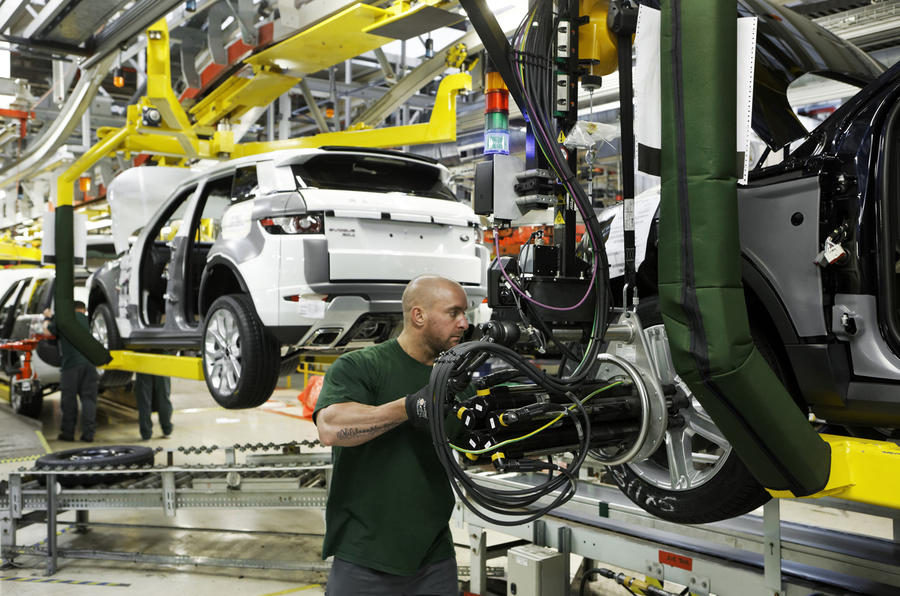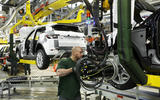There is no way to sugarcoat Jaguar Land Rover’s latest set of financial results. In the final three months of 2018, balance sheets will record the company made a pre-tax loss of £3.4 billion.
Granted, that eye-popping number is inflated by a one-off non-cash charge of £3.1bn. But even if you discount that as an ‘exceptional item’, it’s tough reading: a pre-tax loss of £273 million, compared with £90m in the previous financial quarter.
Whichever figure you choose to focus on – £3.1bn or £273m – neither is positive. And both, in different ways, lay out the challenges Jaguar Land Rover faces in the coming years.
The one-off £3.1bn non-cash charge effectively comes from Jaguar Land Rover adjusting down the value of some of its capitalised investments, such as factories and machinery, effectively recognising that money it has previously invested in them won’t be recovered.
It is understood a number of those investments relate to the production of diesel-engined cars, which have long made up the bulk of Jaguar Land Rover’s sales. That has left the company particularly vulnerable to the slump in demand for diesel, which, right or wrong, seems increasingly to be an irreversible trend. By reducing the ‘carrying value’ of its capitalised investments, Jaguar Land Rover says it will save around £300 million annually in deprecation and amortisation.
Effectively, this is Jaguar Land Rover trying to draw a line under past mistakes by taking one big hit, preparing the firm to move forward under its ‘Charge’ and ‘Accelerate’ turnaround and transformation plans. Through those plans, Jaguar Land Rover is targeting more than £2.5bn worth of savings, which we already know includes the loss of 4500 jobs, this year.
Jaguar Land Rover is also investing in the future; in the final three months of 2018, it invested £1bn, including funding for an engine manufacturing centre to build electric motors, and a battery assembly centre. Both will be located in the UK and help the firm’s plans to offer an electrified version of every model in its line-up from 2020 on.











Join the debate
Add your comment
What we need to establish is
What we need to establish is what VW did with all the paragraphs.
New Defender is a side show?
Obviously everyone is looking forward to the successful launch of the new Defender in all it's variants, however, this is likely to be a premium priced range sold in low volumes. Component and production line sharing should provide reasonable margins but equally distribution and marketing will eat into this while the product re-establishes it's Authenticity and Authority in the market. Get that right and unprecedented volumes might follow.
JLR needs to sell it's volume models in volume! The biggest car market China has slowed but well judged updates of the Evoque, Discovery Sport, E Pace, F Pace, XE and XF should be reviewed to make these vehicles more relevant to the Chinese market, so that when the market reinvigorates JLR should be more competitive. One Chinese issue is rear cabin accommodation, is there a way to provide better perceived front/rear space balance? Reduced front seat travel? Front seat set higher. Better rear cabin trim etc.
Remember, if the car owner is always chauffeured, the driver environment doesn't have to be as premium.
moan moan moan - it is all
moan moan moan - it is all these forums are about these days, but it seems that everyone loves to bash JLR, even when they were making billions of profits, expanding markets, building plants, employing 10's of thousands of people world wide, yet the same old faces always moan - I am so glad i am not related to those idiots.The £3.1BN E.C. is somethign ALL manufactures do, JLR have chosen to do it now, so they can focus on the future, they have a load of all new metal coming over the next 5-10 years, from at least a Dozen Defenders, a New Freelander, Small RR, New Jaguar small car, New RRV, as well as facelifted cars, and not forgetting the new Discovery model that will sit below the current DS, which will grow on the next gen, the DC100 WILL be here, thats the new Freelander, all this costs money and again they are spending themselves out of trouble, they have the fnds to be able to do that.There is NO sale of brands, NO movement of key staff, apart from any that decide to go, and they have invested in a huge new plant to build battery packs in the UK, this is coming, the I-Pace is out selling ALL expectations, the eRR will also be a huge seller, and both are very capable off road, and thats from the horses mouth, the I-Pace can do everything that the Petrol or diesel cars can do off road.And as for the diesel rubbish, I would rather have a diesel car than a petrol one, More MPG, better reliability, More torque, cheaper to run, and for those that bleat on about emmisions, well, does not petrol emit emissions too, yes, and worse, and as for Electric cars, they are worse, far far worse, from the digging up of the metals, to exportation, to the production, and thats before they get near a car, then you have the power stations that will have to power these cars, they dont run on fresh air, even the windmills hit the environment with the build ingredients - If it were not for VW and they fact that the cheated the world, we would not be here now, so why has no brands sued them, and why have the brands NOT had a go at various governments for inaccurate info, the new diesel engined cars are very clean, compared to 30 years ago.So, why not just applaud what JLR have managed to do, over the years, and allow them to do what they can do, and thats build great cars, they did the £3.1bn now so that it wont hit the books in the next financial year, which will be significantly better.
Another ev basher living in
Another ev basher living in this time a protracted rant about a car company blundering from one crisis to another. It makes you weep.
Sell it to the germans and let them do their magic like they did with all the other brands sold to them.
Sell it to them for a quid...
Yeah the germans did wonders
Yeah the germans did wonders for rover group, asset stripped leaving rover gone forever, mg in chinese hands as a budget brand, landrover went to ford and failed with only mini prospering. So yeah sell it to the germans, I'm sure they'll do wonders.
Hopefully with the new models on the way, less dependence on diesel and the further electrification coming, jlr will come back on form. Personally I think they need to broaden their range and have less in house competition.
Of course they did, they are
Of course they did, they are smart, why would you want the crap bits of a company too
Oh hang on, that's possibly why they don't want jaguar!
We really make and design ridiculously overpriced unreliable shite, the very reason its millions in the hole and nothing to do with China or Brexit. Scotty on YouTube called it right.
The most overrated unreliable pieces of turd on the luxury used car circuit